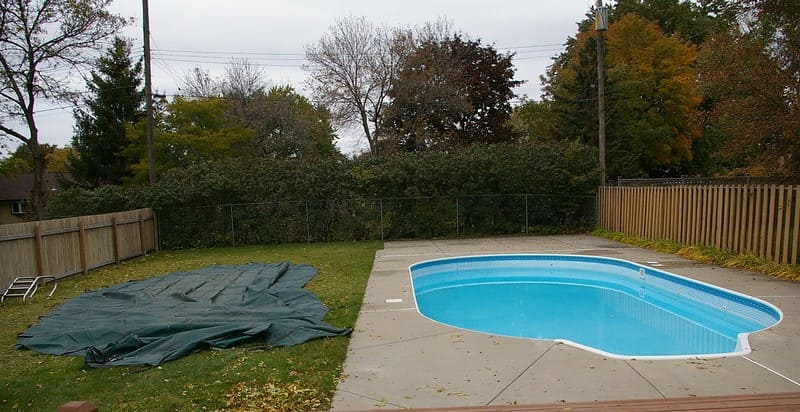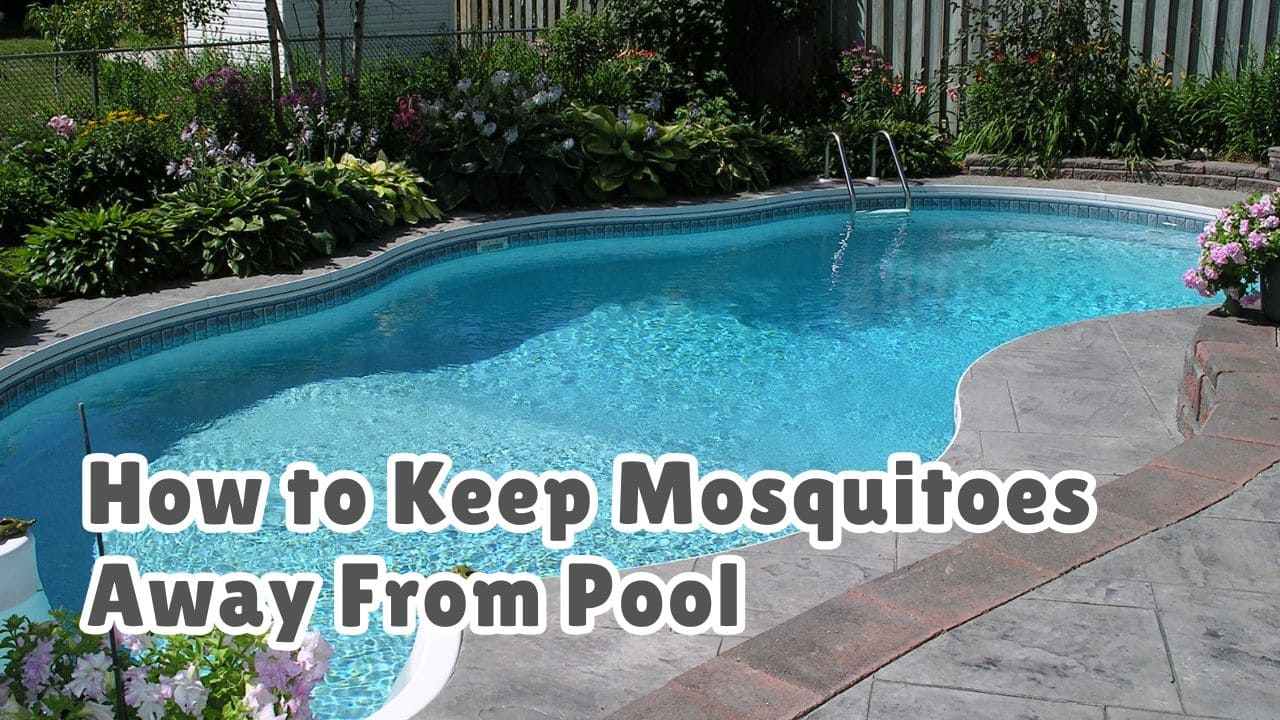Controlling mosquitoes around your pool requires a strategic action plan, as this is not a one time activity, and needs to be followed and maintained on a continuous basis. To learn, how to control mosquito population around the pool; you must bring some changes and adopt certain preventive measures and follow a routine with an action plan as given in detail below.
Table of Contents
Why are pools attractive to mosquitoes?
Indeed pools attract mosquitoes indeed as they need wet and still waters to proliferate. An unused swimming pool is a great place for mosquitoes to breed multiplying their population. They can lay eggs there as it is not cleaned and not in-use. There is no movement in water and all chlorine has got exhausted during many days of exposure to sunlight and buildup of organic matter, fallen leaves and algae growth with pathogens.
This attracts them for laying mosquito eggs in pool, and within few days they hatch into larvae. There are algae and organic pollutants which accumulate in neglected pools serve as food for the larvae and eventually grow into adult mosquitoes.
The presence of mosquitoes in pools is not an issue and the water within them is considered safe to swimmers making use of the swimming pool if the maintenance services are performed correctly, this is due to the fact that chlorine repels mosquitoes. Regular activity in the water occurs owing to swimming of people and presence of pump-filtration systems.
In addition, it is safe to say that regular chlorination of pools together with appropriate planned maintenance of a shock treatment of the pool with chlorine prevents the invasion of any mosquitoes in the pool.
How to keep mosquitoes away from pool
There are set of control measures to keep mosquitoes away from pool area. Implementing these measures ensure control over mosquito populations around the pool.

Image Credit: Flickr by Jeremy Noble | Creative Commons License
Control measures to control mosquito population around the pool
1. Eliminate standing water sources
- Pool covers and tarps: Drain any accumulated water from the folds and inner spaces of the tarpaulins and pool covers. You can use an air-blower to dry it completely after draining.
- Clean and clear pool side: Declutter and clear the area around the pool with any unused objects like pool toys, containers, accessories, etc. Even a small amount of contained or accumulated water will support mosquito eggs to thrive.
- Check for leaks and clogged drainage issues: Check your plumbing lines around the pool for any leakages and drainage issues.
2. Maintain pool conditions
- Chlorine content and pH balance: roper pH, adequate total alkalinity and chlorine content in water should be maintained at such concentration that it does not support any strain of the mosquito larva to develop in the water of the swimming pool.
- Pool filtration and circulation pump system: The water of the swimming pool will in a constant state of flow because water in the swimming pool will have to go through a circulating pump and filtering system. At regular intervals the pumps need to be switched on. The movement, even from standing causes pressure that will break up any eggs deposited or laid by the mosquito in the pool.
- Filter backwash: Mosquito larvae will need organic matter for their survival and therefore we must remove and clear any organic matter and debris from fallen leaves, out of the pool water. This can be effectively done by backwashing the filters with water at a high pressure.
3. Introduce mosquito predators
- Attracting dragonflies: These dragonflies are very helpful in overcoming the problem of mosquitoes too. We can attract these dragonflies in our backyard garden or near the vegetation around the pool, including other mosquito predators as covered in this article here,
Natural Mosquito Predators: What Animals Eat Mosquitoes? - Attracting mosquito eating birds: There are many birds which are natural mosquito predators like purple martins, swallows, wrens, cardinals, chickadees and we can attract these mosquito eating birds as covered in this article here,
Mosquito Eating Birds: 22+ Birds that Eat Mosquitoes - Adding larvae eating fish in garden ponds: We cannot add fishes directly in the pool rather if we have any decorative ponds in the garden surrounding the pool than we have to include these mosquitofish that will take care of the mosquito population in pond that will lead to the reduction of mosquitoes around the pool.
4. Implement biological and chemical control measures
- Mosquito dunks: Natural larvicides like BTI (which is also referred to as mosquito dunk) can be used on any remaining water surrounding the pool including ponds, birdbaths, water features, and even the pool water as is safe. However, there is a catch; they should not be directly added to the pool water. The principal reason behind this is that these make the water murky and may promote algal growth which will eventually cause surface stains.
- Chlorine pool shock: Pool shock using chlorine will also exterminate any mosquito egg in the pool, eliminate bacteria and other pathogens, and remove organics. Thus, chlorine pool shock will give multiple benefits with pool water sanitization effect.
- Essential oil sprays: The application of sprays made from citronella or even concentrate of tea tree oil as well as lavender, eucalyptus, etc. helps in avoiding the presence of mosquitoes and even their bites. while yes they do repel mosquitoes, but it only lasts a short time.
- Chemical mosquito repellents: EPA-approved insecticides can be sprayed on vegetation around the pool to get mosquito prevention for longer periods. DEET, permethrin, picaridin are few of them that can be used pre-cautiously.
5. Improve landscaping around the pool
- Prune tall grasses and thick shrubs: Mosquitoes will typically look for a host in dark and shaded humid areas surrounded by tall grasses and bushes. Thus, it’s very important to make sure that the lawn and the landscape around the swimming pool are well maintained and cut so that there are no chances of mosquito resting spots.
- Grow plants that are known to repel mosquitoes: Even though it is not possible to completely stop their reproduction cycle, some infestation can furthermore be controlled by simply planting plants such as lavender, marigold, and sage which deter mosquitoes from venturing near the garden beds, the sides of swimming pools as well.
- Spread cedar mulch across the pathways and green vegetation: Mosquitoes do not like strong odor; hence cedar having a strong scent which is known to repel many insects can be quite handy. We can spread some cedar mulch across the pool area, that will again deter mosquitoes.
- Burn mosquito repelling herbs in firepits: Firepits creates an open flame with smoke which is unpleasant for mosquitoes. And there are some herbs like cinnamon sticks, dried sage leaves, cedar bits and logs, dried coffee grounds, that we can burn in firepits to keep mosquitoes at bay.
6. Limit outdoor light sources
- Minimize use of outdoor lights in evening: We should minimize the use of outdoor lights in evening times, as this will attract mosquitoes. We can use yellow lights, LED’s or UV lights for bugs, which are not bright and avoid any chances of mosquito attraction to bright lights.
Action Plan to control mosquito population near pool
1. Weekly pool maintenance routine
- Maintain adequate chlorine levels, pH balance, alkalinity, etc. in the pool water
- Drain any water that has been collected on the covers, do not left any object that may collect even the spoonful of water.
- Clean the filtration system using backwash to prevent buildup of organic impurities.
2. Monthly Inspections, checks and treatments
- Use mosquito dunks or larvicides in nearby ponds and water features
- Trim poolside vegetation on a regular basis.
- Decorate your pool side garden with mosquito repellent plant based landscaping.
- Check and repair any leakages, clogged drainages, water pooling near corners, etc.
3. After heavy usage or during peaking seasons or after rainfall
- Check for any water accumulating on pool covers, containers or other surfaces.
- Clean kiddo pools, water toys, inflated pool accessories, wet towels and rugs, and any objects that may hold water.
- Clean and maintain birdbaths, pet water bowls, gardening cans, trash cans, etc.
- Check for puddle formations, marsh lands; especially after heavy rainfall.
- Re-application of mosquito repellent sprays, if needed.
📰 Must Read,
✔️ Garlic Mosquito Repellent: How to Use Liquid Garlic to Keep Mosquitoes Away?
✔️ What does Mosquito Larvae look like in Water?
Conclusion: Measures required for keeping mosquitoes away from pool
Managing mosquitoes around your pool and preventing any infestation in the pool water is a challenging task. It involves proper pool maintenance, various preventive measures, attracting mosquito predators, biological and chemical controls, suitable landscaping, altogether with a thorough action plan.
Following these measures with a routine plan will definitely help you in managing and controlling mosquito populations around the pool.
Frequently Asked Questions (FAQs)
-
Do mosquitoes like chlorine?
Mosquitoes do not like chlorine and their tolerance levels depends on the actual concentration of chlorine in the water. Pools which are not sufficiently chlorinated may turn into mosquito hotspots where they may breed. While high chlorine levels create an inhospitable environment for larvae and it disrupts their cellular functions, because of which they can’t survive.
-
Do mosquitoes lay eggs in pools?
When pools are not cleaned regularly and unmaintained specially when not in use for along time, than mosquitoes tends to lay eggs. This is because of no movement in water and inadequate levels of chlorine. Any still or standing water body will attract mosquitoes for laying eggs. Bacteria and algae growth, on the other hand acts as a source of food thereby promoting larvae growth.
-
Do salt water pools attract mosquitoes?
Salt water pools are not mosquito proof, they can also attract mosquitoes. The salt concentration in salt water pool is atleast 10times lesser than ocean water. Mosquitoes can survive in this slightly saline water. To keep the mosquitoes away from salt water pools, the salt concentration as well as chlorine levels should be checked and maintained from time to time..

